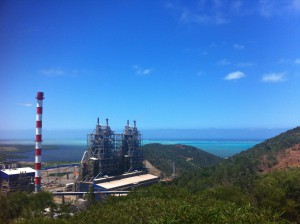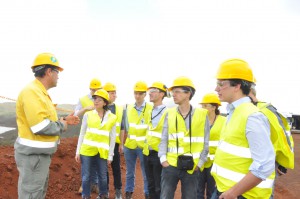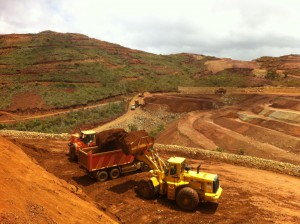Liliana Doganova and Brice Laurent have created a minor in “Public Affairs and Innovation” (API) as part of the engineering training at Mines-ParisTech, which meets both the current challenges of innovation and an increasing demand for engineers with an educational background in public affairs. Interview.
Minors at Mines-ParisTech?
Brice Laurent: At the École des Mines, minors are an important part of the engineering students’ training because they determine the educational plans at the end of their schooling and the final work required to complete their studies. The training starts at the beginning of the 2nd year with a study trip. During the 3rd year, it is continued with an intensive course followed by a practical training of at least four months which serves as a base for their final work.
The civil engineering degree awarded by the Ecole des mines is a non-specialized diploma. Nonetheless a minor provides a specialization. It doesn’t determine the whole career of the graduates, nor even their first position; it is up to the engineering students to use their minor as they see fit.
The minor in « Public Affairs and Innovation »?
Brice Laurent: « Public Affairs and Innovation » is a minor in social science with a focus on the political dimensions of scientific, technical and industrial innovation. By political we mean what relates to regulation, law, scientific and tech nical development planning, as well as to collective decision-making and consultation with all the actors involved, even when identifying all of them is problematic. The minor includes also economic valuation and price-fixing, in the view of examining situations in which theses processes are not obvious.
nical development planning, as well as to collective decision-making and consultation with all the actors involved, even when identifying all of them is problematic. The minor includes also economic valuation and price-fixing, in the view of examining situations in which theses processes are not obvious.
Liliana Doganova: The pedagogical part of the minor strongly relies on our own – and more generally on the CSI’s current research. The training program has a double originality. To our knowledge, in France, there is no other training in public affairs specifically designed for engineering students that focuses on scientific and technical issues. The specificity of our training also lies in its approach to scientific and technical issues based on Science & Technology Studies, and on the research developed by the CSI on technical democracy and on market construction – not taken for granted, but considered as a social activity which raises political issues.
Brice Laurent: This minor was designed by joining education and research activities. In concrete terms, the study trip organized in February of this year was combined with an exploratory research project on the transformation of the mining regulations in New Caledonia. This trip to New Caledonia had obviously an educational purpose for the students, and it was all the more interesting that its aim was to conduct a collective investigation involving the students, with our colleagues anthropologists from the Institute for Research and Development (IRD).
A research-based teaching approach?
Liliana Doganova: The students were involved in the preparation of the interviews and in the formulation of the research questions. The report stemming from this work, co-authored with the students, was first presented to people who are knowledgeable about the mining regulation and New Caledonia (Madeleine Akrich, the supervisor of a PhD on the subject, Anne Duthilleul, special advisor for overseas large mining ventures, and Romain Soubeyran, the director of Mines ParisTech). In the coming years we will maintain this strong connection between research and educational activities. It’s a specificity of the minor.
Brice Laurent: In the subjects dealt with in the minor – on the occasion of the study trip, in the course program, or the subjects chosen by the students – market construction issues are in most cases hardly separable from political issues: who makes decisions, who does one agree with, what are the forms of democratic legitimacy? This conjunction is consistent with the new research issues addressed at the CSI: our objective is indeed to connect the sociology of markets with the sociology of technical democracy, because it is a crucial issue which arises today in many projects. The interest of this minor lies in the opportunity of working on a very rich range of subjects providing grounds for reflection in social science research and raising strong theoretical issues. At the same time, we work on extremely concrete issues. Practical issues arise; the actors the students meet, representatives of public authorities, industrials or NGO, strive to find solutions. The valuation issues and the issues relating to mining regulations in New Caledonia are real concrete issues.
The experience of New Caledonia?
Liliana Doganova: As for the study trip, the challenge is to find sites where it is possible to discover what a field survey in social sciences is and to see the political issues our minor is interested in emerge from the field. In the New Caledonian case, it is rather obvious. The territory is relatively small and in two weeks we were able to see a range of very different actors: representatives of public authorities and administration, industrial actors, environmental associations, traditional authorities. Reviewing the questions from the point of view of each of the actors allows to recognize almost obviously the complexity and the political importance of these questions; it is often more effective than reading a text.
weeks we were able to see a range of very different actors: representatives of public authorities and administration, industrial actors, environmental associations, traditional authorities. Reviewing the questions from the point of view of each of the actors allows to recognize almost obviously the complexity and the political importance of these questions; it is often more effective than reading a text.
Brice Laurent: It is somehow a commonplace to say so, but the New Caledonian case is really a laboratory. A small-sized closed-in place where all the issues are concentrated, but where stakes are very high because of the scale of the industrial projects, associating mines and plants and being some of the world’s larger industrial plans in terms of financial investment. There are very different economic models (to transform or not the ore on-the-spot, exploiting ores of various grades, etc.). The technical expertise itself is highly debated.
Liliana Doganova: The objective is not to turn the students into specialists in mining activities or nickel valuation, but to help them understand – and this is not an easy shift – that technical or economic choices in any industrial activity or development generally raise political issues. The study trip is a good introduction.
An interdisciplinary – and field training
Liliana Doganova: The 3rd year training program in social sciences is built on four pillars: Sciences and Technology Studies, political sciences, in particular the issues of political representation, economic sociology, especially from the perspective of market construction, and finally regulatory and legal issues, on which we are working with the Research Center on Risks and Crises (CRC) at the École des Mines. Throughout the month of October, the intensive course program includes reading and discussion of social science texts, work on concrete cases, interventions of polit ical, industrial, associative or academic actors. These courses allow us to start preparing with the students the subject they will be working on during their practical training.
ical, industrial, associative or academic actors. These courses allow us to start preparing with the students the subject they will be working on during their practical training.
Brice Laurent: At the École des Mines, the advantage of the minors is that they concern a small number of students; it is thus possible to adapt to a variety of students profiles and of requests from our partners. The minor determines the subjects, but with a gradient according to the types of practical training planned and to the fields they involve. Some of them lend themselves rather to an operational work in a company, and our contribution as professors of the minor will consist in accompanying the reflection of the trainees on the questions they are examining, in putting these questions in perspective, in comparing them with other subjects. In other cases, the practical training will provide contributions to the partner’s work, and the questions the trainee will develop will be closer to those in social science research.
This practical training allows the students to face a real situation they will have to analyze in detail. It results in the drafting of a written report and an oral presentation. We would like to be a bit innovative in the form of the work presented for the completion of the studies; a report is obviously a possible form, but it may also be a short article, such as a policy paper, for example, or even a publication.
How to value the minor on the professional level?
Brice Laurent: The way the engineering students value their minor, whatever it is, is very variable. In their CV and professional interviews, some graduates emphasize what they have learned in the minor and make a real specialty of it; for others, the minor is rather a sort of coloration that has to do with the discovery of a new sector and that they do not associate to their early career.
Engineers trained at the École des Mines are reputed to know perfectly how to calculate, to be very good at science, to have all the necessary abilities, but showing a capacity for policy analysis can really make a difference. Today, any industrial project of some size has to face numerous uncertainties in terms of political discussion (who to discuss with, who the actors are, how deal with controversial situations) or in terms of regulatory development. Public authorities have to deal with an increasing number of situations where they have to manage uncertainty cases related, for example, to sanitary risks or with the evolution of the markets. The skills acquired within the framework of the minor “Public affairs and innovation” can thus answer a demand from strategy departments or from statutory affairs in companies or consulting firms, and also be valued in the operational conduct of projects.
What will be the future developments of the minor?
Brice Laurent: We would like the study trip and the practical training to be held in sites that are not traditionally invested by the École des Mines students. NGOs, for instance. These often multinational organizations seek the skills of engineers. There is a demand from the engineers to work in such organizations. We also think of the international or national agencies, such as the French Agency of Development (AFD), for example.
We already have partnerships with a set of institutions in France and abroad that can be developed in the future, in particular within the framework of Paris Sciences et Lettres (PSL). Besides, building partnerships with the French institutions providing a training in public affairs seems interesting, in particular for the students who would like to attend a Master program there. With our partners abroad, the objective would rather be to welcome or to co-supervise practical training.

